The work of Southern Baptists in the country of Jordan began in 1951, and today it is considered “an incredible success story” by the International Mission Board’s regional leader for Northern Africa and the Middle East, John Brady, who considers Landrum his hometown.
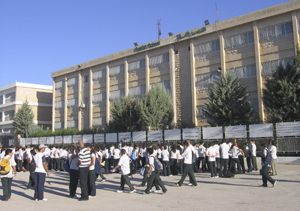 Students at the Baptist school in Amman line up in front of the school for some inspirational words from their principal before the start of classes.
Students at the Baptist school in Amman line up in front of the school for some inspirational words from their principal before the start of classes.Brady, the son of former IMB missionaries Otis and Martha Brady of Landrum, met recently with nine Southern Baptist editors in the home of Nabeeh Abbassi, president of the Jordan Baptist Convention, and his wife Ruba, who is director of the international Arab Woman Today Ministries. He also is pastor of the Husn Baptist Church near Amman, the capital of Jordan.
The IMB has played a decreasing role in Jordan for good reason, according to Brady. The Jordanian Baptists – even though they are “not mature the way we would like to be,” Abbassi pointed out – have been “excellent stewards of what has been planted among them,” Brady emphasized, and are in a position now to “train their own pastors and construct their own buildings.”
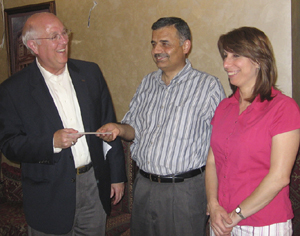 The Association of State Baptist Papers recently donated $1,000 to the work of the Jordan Baptist Convention. Bob Terry, left, editor of the Alabama Baptist, presents the check to convention president Nabeeh Abbassi and his wife Ruba.
The Association of State Baptist Papers recently donated $1,000 to the work of the Jordan Baptist Convention. Bob Terry, left, editor of the Alabama Baptist, presents the check to convention president Nabeeh Abbassi and his wife Ruba.Brady said that IMB personnel in the region are putting most of their efforts into countries that are “100 percent Muslim,” which means, he explained, that approximately 98 percent of International Mission Board workers in Northern Africa and the Middle East are laboring “outside of Jordan,” even though they continue to “walk alongside the Jordanian Baptists in a “friendly, brotherly relationship.”
The Jordan Baptist Convention was established six years after Southern Baptists launched their work there, and today it is comprised of 20 churches with approximately 1,350 members, even though anywhere from 3,000 to 5,000 of Jordan’s 6 million people attend the convention’s Baptist churches.
Baptist leaders in Jordan estimated that the country’s population is 5 to 10 percent Christian. It is estimated that 8,000 to 10,000 people in Jordan attend churches that are classified as evangelical.
Southern Baptists had a direct hand in establishing seven of the first Baptist churches in Jordan, who in turn planted the other 13 churches that now make up the Baptist convention.
While the Jordanian Baptists are largely on their own now, Brady informed the editors that the International Mission Board is working to link Baptists in Jordan with American churches and teams of volunteers in partnerships to assist the Jordanians in developing their resources.
 Students work at their computers at the Baptist school in Amman.
Students work at their computers at the Baptist school in Amman.Meanwhile, the IMB is spreading its resources as widely as possible to reach the most people it can. According to Brady, there are 137 people groups in Northern Africa and the Middle East who lack a Christian witness.
The mandate of the International Mission Board is “not to the church, but to the lost,” Brady said.
In the early years of Southern Baptist work in Jordan, the International Mission Board founded a hospital in the town of Ajloun. The hospital is no longer there, but a Baptist camp is, and on the day of the visit by the editors a training session for local pastors and laymen was in full swing, led by Shaun Shorrosh, an IMB strategist who is a native of Lebanon but grew up in the United States. The IMB often rents the camp’s facilities for its training sessions to “mobilize the local church” – but the camp is operated by the Jordan Baptist Convention.
Currently, the conference center’s activities run through the summer, but a year-round schedule is needed to make ends meet financially.
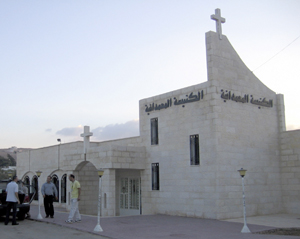 Sunday night in Jordan – the Husn Baptist Church near Amman.
Sunday night in Jordan – the Husn Baptist Church near Amman.The Jordan Baptist Convention also operates two schools – one in Amman and the other in Ajloun. The Amman school has 1,250 students, with more than 500 of them in high school. Muslims make up 40 percent of the K-12 student body, with 60 percent of the students Christians. The student body is 5 percent Baptist.
The Amman school was established by the International Mission Board in 1974, but ended its sponsorship in the early 1990s. It is now self-supporting with “99.9” percent of its students going on to universities in Jordan or abroad.
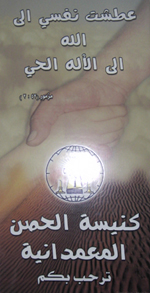 An inscription in the vestibule of the Husn Baptist Church near Amman is from Psalm 42:2: “My soul thirsts for God, for the living God. When can I go and meet with God?”
An inscription in the vestibule of the Husn Baptist Church near Amman is from Psalm 42:2: “My soul thirsts for God, for the living God. When can I go and meet with God?”Suha Jouaneh Shanin, who earned her master’s degree at Samford University in Alabama, is the school’s principal.
The Ajloun school was founded in 1952 by the International Mission Board as a K-12 institution, but has dropped back to K-9. It hopes one day to return to a K-12 program. The IMB ended its affiliation with the Ajloun school seven years ago.
The school can accommodate 452 students, but has 280 now. Essar Mazahreh, who formerly lived in New Jersey where her parents still reside, taught at the school for 16 years before becoming principal a year ago.
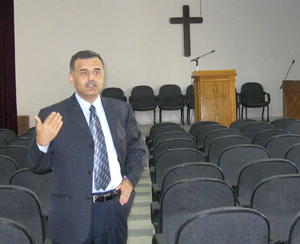 Nabeeh Abbassi, pastor of the Husn Baptist Church near Amman and president of the Jordan Baptist Convention, speaks to the visiting Southern Baptist editors before the Sunday evening service begins. After the editors were introduced, Bob Terry of the Alabama Baptist spoke on behalf of the visiting journalists, saying to the congregation, “We are here to be a part of encouraging you in the Lord.”
Nabeeh Abbassi, pastor of the Husn Baptist Church near Amman and president of the Jordan Baptist Convention, speaks to the visiting Southern Baptist editors before the Sunday evening service begins. After the editors were introduced, Bob Terry of the Alabama Baptist spoke on behalf of the visiting journalists, saying to the congregation, “We are here to be a part of encouraging you in the Lord.”Presentation of the gospel through prayer, Bible reading and in the personal lives of the teachers is a vital part of the educational programs at both schools, Abbassi pointed out. A convention-operated Baptist bookstore also can be found in Amman, and even though it does not make much money, it is, according to Abbassi, a place where people “come to Christ.”
The pastor and convention president noted that such institutions as the schools and bookstore provide a setting in which evangelism can be carried out in a way that is not threatening, which he believes is vital to the future success of the Baptist witness in his country.
Abbassi is pleased to see that the Baptists in his country are growing in number and in spiritual maturity – and what is also important, they have a good image among the people of Jordan.